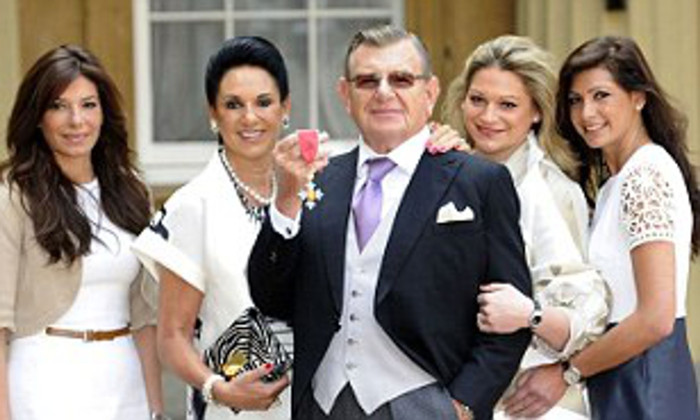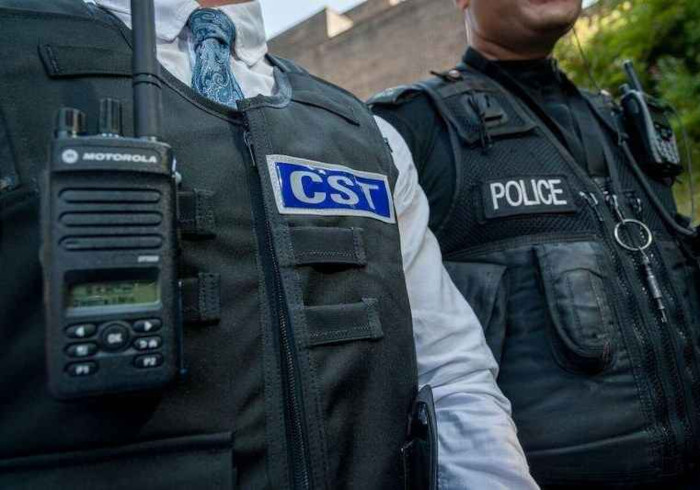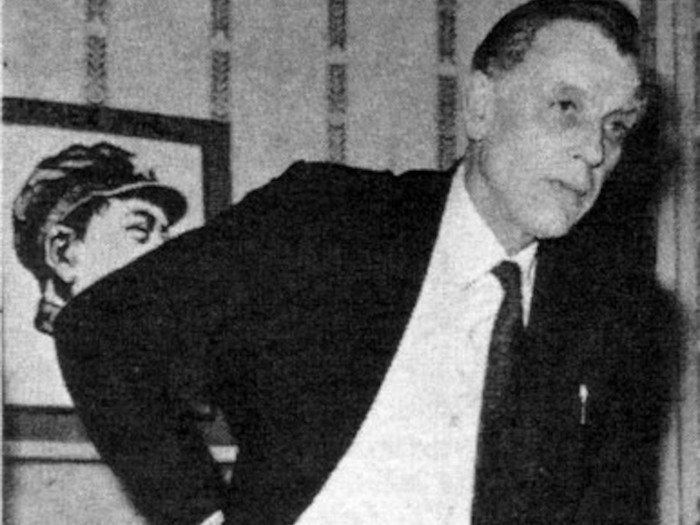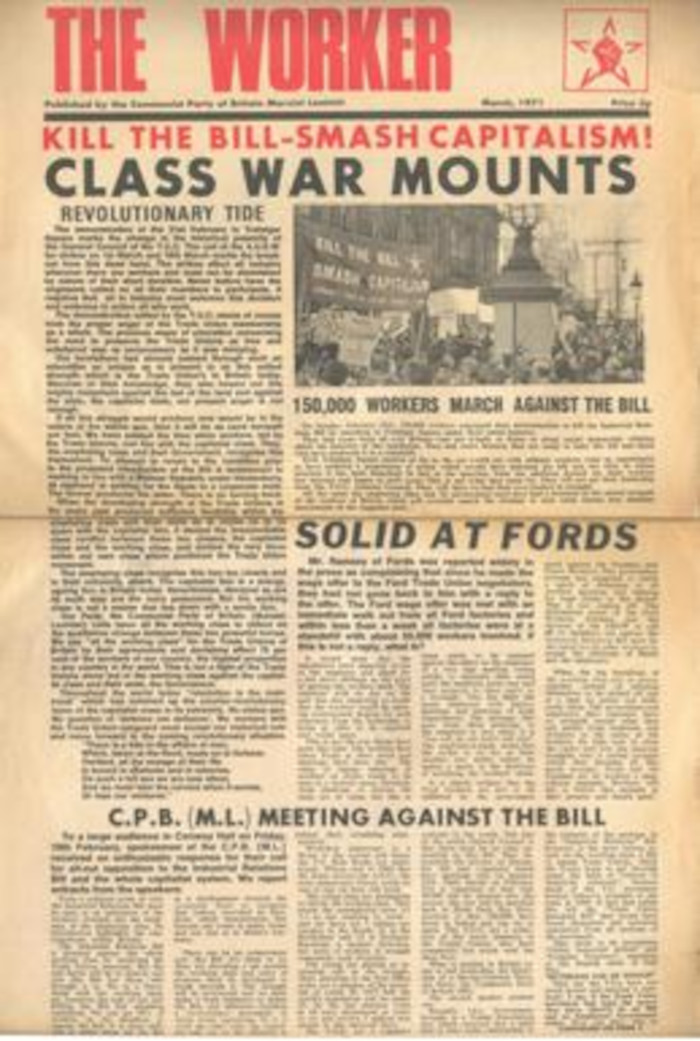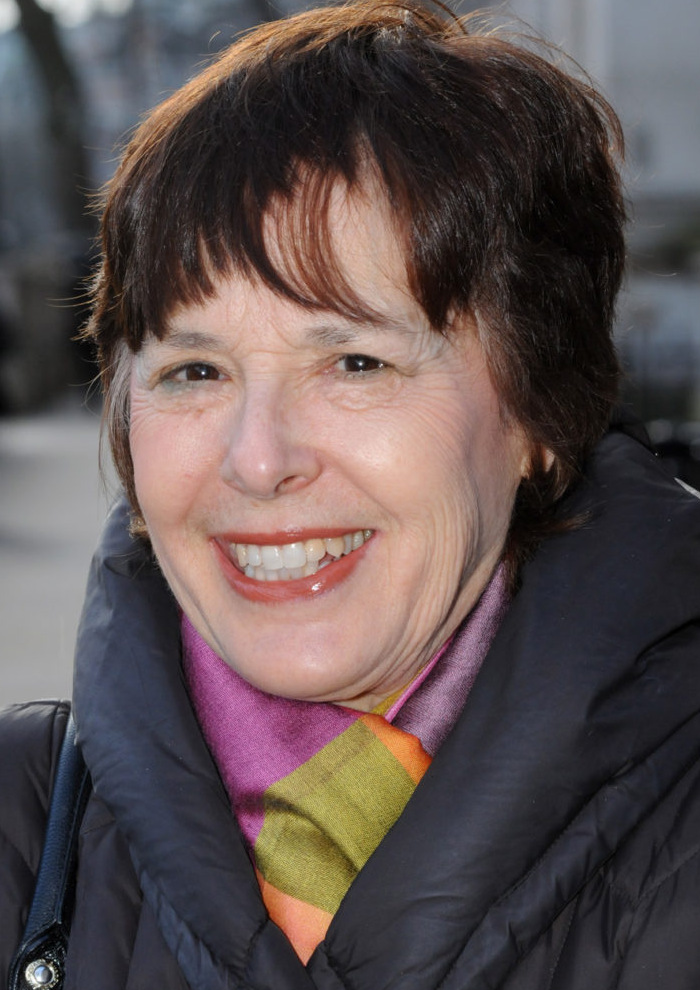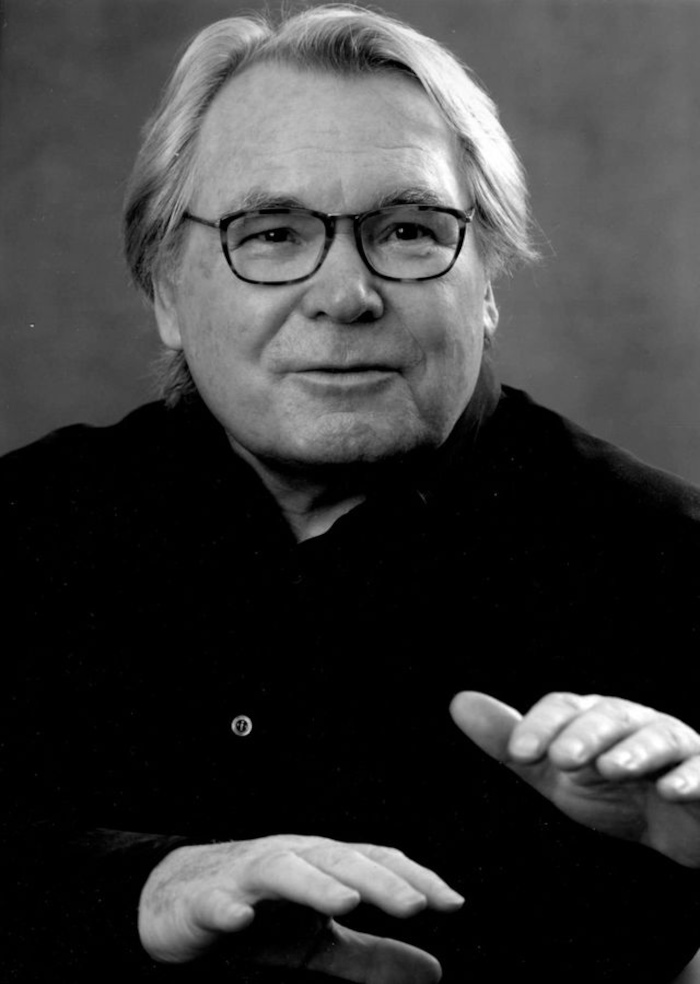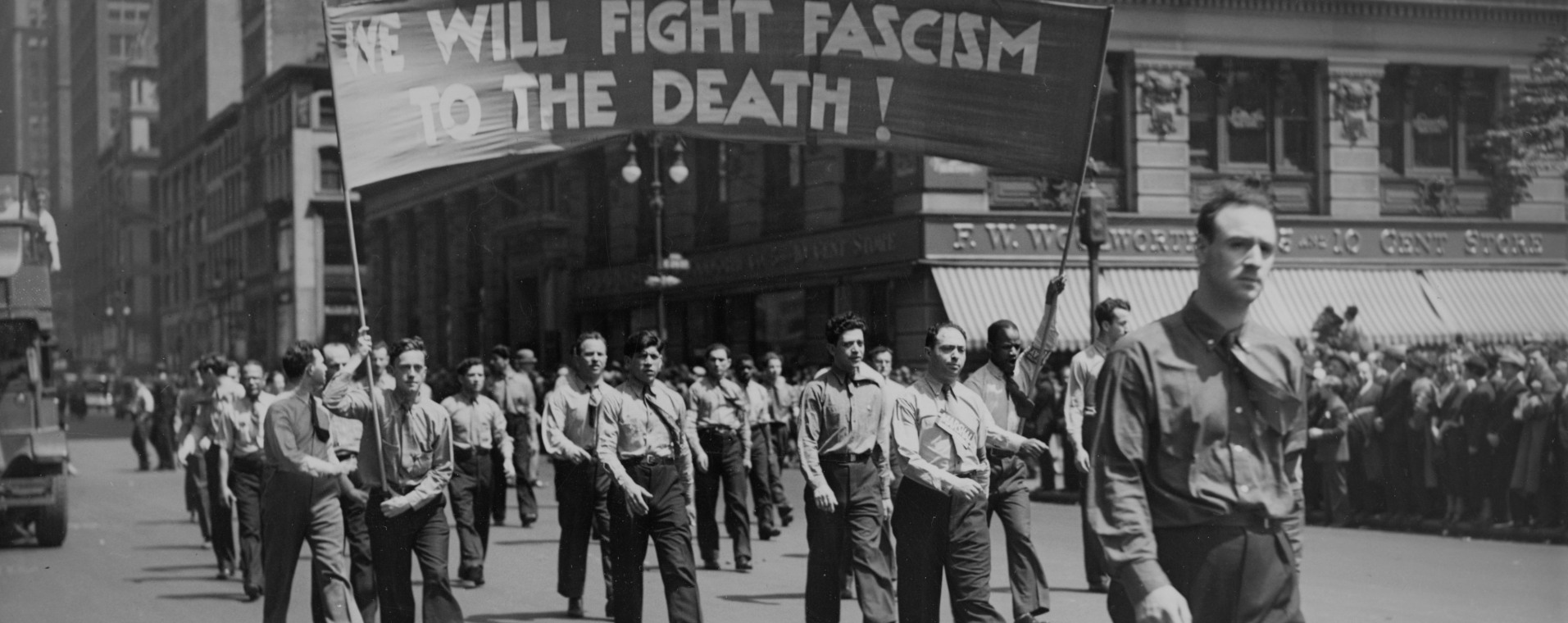
Communist May Day parade, New York City, 1930s.
Anti-Fascism
Anti-fascist movements emerged first in Italy during the rise of Benito Mussolini, but they soon spread to other European countries and then globally. In the early period, Communist, socialist, anarchist and Christian workers and intellectuals were involved. Until 1928, the period of the United front, there was significant collaboration between the Communists and non-Communist anti-fascists.
In 1928, the Comintern instituted its ultra-left Third Period policies, ending co-operation with other left groups, and denouncing social democrats as "social fascists". From 1934 until the Molotov–Ribbentrop Pact, the Communists pursued a Popular Front approach, of building broad-based coalitions with liberal and even conservative anti-fascists. As fascism consolidated its power, and especially during World War II, anti-fascism largely took the form of partisan or resistance movements.
The rise of Oswald Mosley's British Union of Fascists (BUF) in the 1930s was challenged by the Communist Party of Great Britain, socialists in the Labour Party and Independent Labour Party, Irish Catholic dockmen and working class Jews in London's East End.
The Christian Democratic Union of Germany politician Tim Peters notes that the term is one of the most controversial terms in political discourse. Michael Richter, a researcher at the Hannah Arendt Institute for Research on Totalitarianism, highlights the ideological use of the term in the Soviet Union and the Eastern bloc, in which the term fascism was applied to Eastern bloc dissidents regardless of any connection to historical fascism, and where the term anti-fascism served to legitimise the ruling government.
Anti-fascism utilises a policy named "strategy of tension", this is a policy wherein violent struggle is encouraged rather than suppressed. Historically the purpose of such a policy has been to create a general feeling of insecurity in the population and make people seek security in a strong government. The strategy of tension is most closely identified with the Years of Lead in Italy from 1968 to 1982, wherein both far-left Marxist and far-right neo-fascist extra-parliamentary groups, and state intelligence agencies performed bombings, kidnappings, arsons, and murders. From 1968–1982, Italy suffered numerous terrorist attacks by both the left and the right, which were often followed by government round-ups and mass arrests.
Prevention Dissent Repression Isolation Terrorism
An allegation, especially made by adherents of the Italian Communist Party (PCI), was that the government trumped up and intentionally allowed the attacks of communist radicals as an excuse to arrest other communists, and allowed the attacks of far-right paramilitary organisations as an extrajudicial way to silence enemies. Various parliamentary committees were held to investigate these crimes as well as prosecute them in the 1990s. A 1995 report from the Left Democrats to a subcommittee of the Italian Parliament stated that a "strategy of tension" had been supported by the United States to "stop the PCI, and to a certain degree also the PSI, from reaching executive power in the country".
Searchlight is a British magazine, founded in 1975 by Gerry Gable, to publish exposés about racism, antisemitism and fascism in the United Kingdom and elsewhere. The magazine is published and edited by Gerry Gable. An archive of historical materials associated with the magazine, The Searchlight Archive, is housed at the University of Northampton. The current Searchlight magazine was preceded by a newspaper of the same name, which was founded in 1964 by left-wing Labour Party Members of Parliament Reg Freeson and Joan Lestor with Gerry Gable as "research director".
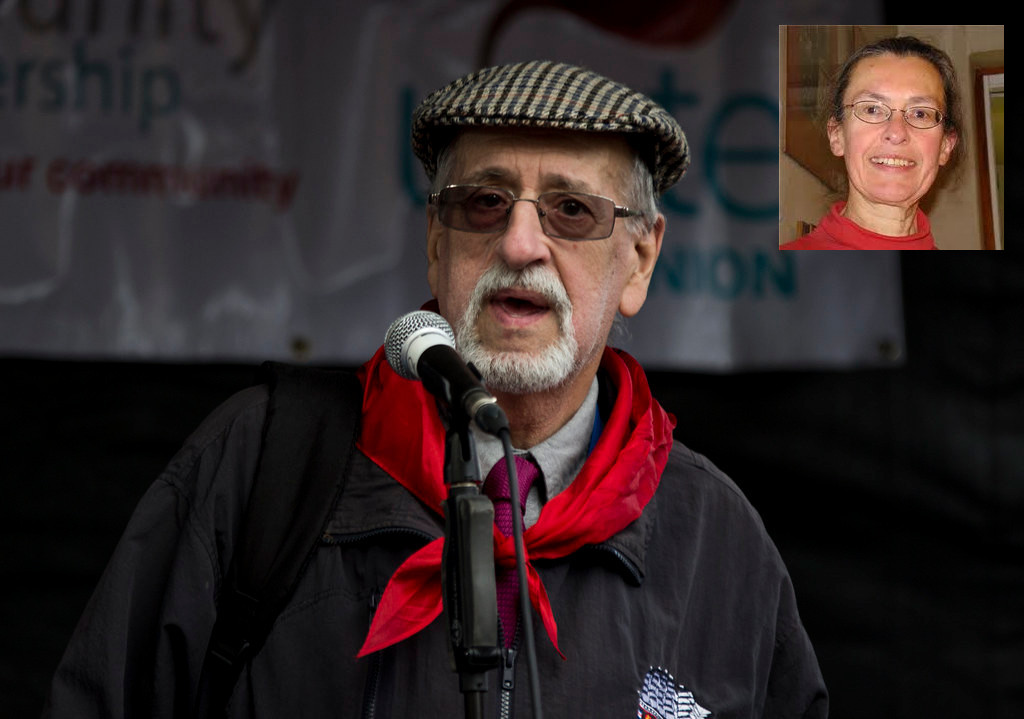
Gerry Gable's first public media appearance was when he was prosecuted for breaking into the flat of right-wing historian David Irving in 1963. His defence counsel Ivan Lawrence (now chair of the Home Affairs Select Committee) said in mitigation 'they intended to hand over any documents or books they found to the Special Branch'. In 1991, Mr Gable was charged with and later acquitted of organising an attack on a group of "fascists" who were holding a private meeting in Kensinglon Library. He invaded the meeting with a group of thugs from the violent, proIRA Red Action group. Although Gable was eventually acquitted of organising the attack he failed to explain where he and his thuggish friends obtained their forged tickets for the meeting. In May 1977, when employed by London Weekend Television, he wrote a notorious (and he hoped confidential) document that has passed into infamy as the 'Gable Memorandum'. In it, he outlined his spying on radical journalists in a celebrated press freedom case, which involved among others Philip Agee. He concluded with the memorable phrase 'I have given the names I have acquired to be checked out by British / French security services. It is now a time of waiting for feed-back and also further checks here.'.
In 1984, editor Gerry Gable was commissioned by the BBC to provide research materials for a Panorama programme, "Maggie's Militant Tendency". The episode was to focus on a claim of right-wing extremism in the Conservative Party. Gable asserted that his research drew upon the information previously published in Searchlight. In response to the claims by Gable that two Conservative Party figures, Neil Hamilton and Gerald Howarth, were secret extremist Nazi supporters, actions for libel were brought against the BBC and Gable. The programme had alleged (not admitted as evidence in court) that Hamilton gave a Nazi salute in Berlin while 'messing around' on a Parliamentary visit in August 1983. The Guardian reported that "Writing for the Sunday Times after the collapse of the case, he admitted he did give a little salute with two fingers to his nose to give the impression of a toothbrush moustache. "Somebody on the trip clearly did not share our sense of humour," he wrote." The BBC capitulated on 21 October, and paid the pair's legal costs. Hamilton and Howarth were awarded £20,000 each, and in the next edition of Panorama, on 27 October, the BBC made an unreserved apology to both. The case against Gable was dropped.
In April 1986, under pressure because of an ongoing libel action by some Tory MPs against the BBC for a Searchlight sourced story on 'fascist infiltration' into the Tory party, Gable panicked. He printed a fictitious tale in that month's issue (p2-3) implying that a Tory MP involved in the libel action and others were planning to kidnap and murder him. In fact, they were only investigating him, and the 'harassment' described is far less than has been undertaken by Searchlight against anti-fascists. Knowing the story was a fabrication to gain sympathy, Searchlight were careful not to name the MP supposedly concerned. They passed the story to Private Eye, who were rash enough to print the name (2/5/86) The MP concerneed and a business associate successfully sued Private Eye winning substantial 'undisclosed damages'. What is germane here isn't so much the lies, but how the 'plot news' was received. In the original Private Eye piece, Gable admitted discussing the matter with Special Branch. A more recent account by Gable associate Gary Murray with 'Mr Gable's kind permission' outlined that after hearing others were investigating him, 'Gable's next step was to speak with a friend in Special Branch who decided to arrange armed bodyguards to watch over him.'. when the police enquiries were concluded a report was given to Mrs Thatcher at a meeting in Downing Street and to Lord Bridge then Chairman of the Security Commission.
“Just how could a supposedly anti-establishment journalist of Left-leanings, running a magazine with 7,000 circulation (maximum) have the political clout to get threats against him (real or invented) investigated by the Security Commission Chairman (an oversight body) and even the Prime Minister? The simple answer suggested is that this kind of protection is not available to 'lefty radicals', but is forthcoming to prized state assets.”.
Forewarned Against Fascism published between 1978 and 1981 by Dave Roberts and Daphne Liddle, the latter even today a photographer for the Searchlight 'team'. From issue 5 (November 1978) they began publishing 'hit-lists' of fascists, giving hundreds upon hundreds of names / addresses / work-places. At the same time Roberts and Liddle were calling upon the state to increase its surveillance and powers of the very organisations whose members were intended to be the targets of attack and thus public disorder. The magazine has hostile relations with some other anti-fascist groups in Britain. The magazine group was originally part of the steering committee of Unite Against Fascism and resigned their position after differences over tactics. Publisher Gerry Gable is known to have links with MI5. His leaked 1977 London Weekend Television memo stated that he had "given names I have acquired to be checked out by British/French security services". A 1987 profile referred to Gable's "wide range of contacts, including people in the secret services". Searchlight relies for its material on those involved in the far-right. This includes a range of infiltrators, defectors and casual informers. The most infamous known defectors were Ray Hill, Sonia Hochfelder, and Matthew Collins, now of the Hope not Hate campaign. Raymond Hill was a former deputy leader of the British Movement and a founder member of the British National Party. Hill also secretly worked for Searchlight in feeding information about the groups' activities.
The daughter of a Jewish father and a Gentile mother, Sonia Hochfelder led a rather strange political career for someone of her heritage before becoming a dedicated “anti-fascist” (in the mid-1970's Hochfelder was in a tiny but militant Maoist group, the self-styled 'Communist Party of England-Marxist Leninist' (hereafter CPE-ML). As well as being a fairly important member of the National Front, she contributed articles to League Review, the theoretical journal of the League of Saint George. Hochfelder, is today married to the editor of Searchlight, Gerry Gable, and was a co-founder in 1992 (later Executive Director) of the 'Searchlight Educational Trust'. At the insistence of the British National Party, Searchlight and the associated Searchlight Educational Trust were investigated by the British Charity Commission of England and Wales as a result of a complaint that claimed that the Educational Trust had been engaging in political activity incompatible with its charitable status. The Commission's report stated that, in its opinion, the Searchlight Educational Trust had gone beyond the Commission's guidelines on political activities, and found there was a need for a greater distinction between the public activities of Searchlight Magazine and the educational trust.
Ray Hill revealed himself to be a "mole" in 1984 in a documentary for Channel 4 which focused on the links between the British far right and international terrorism, as well as plots to launch bomb attacks in London, said to have been planned by the National Socialist Action Party. Column 88 and the League of St. George were also heavily implicated in Hill's claims. Hill's grassing was claimed to have began in 1980 with anonymous calls to the anti-fascist magazine Searchlight. The mystery caller would offer juicy information about the activities of the far right in Leicester. On one occasion he provided the complete membership of the British Democratic Party, an offshoot of the National Front. Other than the British far-right, Hill's revelations also included claims about terrorist involvement of their French counterparts and Fédération d'action nationale et européenne leader Mark Fredriksen. Hill's revelations sent shockwaves through right wing politics and encouraged a culture of suspicion. Indeed, soon afterwards when Joe Pearce approached Tyndall about bringing the Young National Front en bloc to the BNP, Tyndall rejected his overtures for fear that Pearce might also be a "mole".
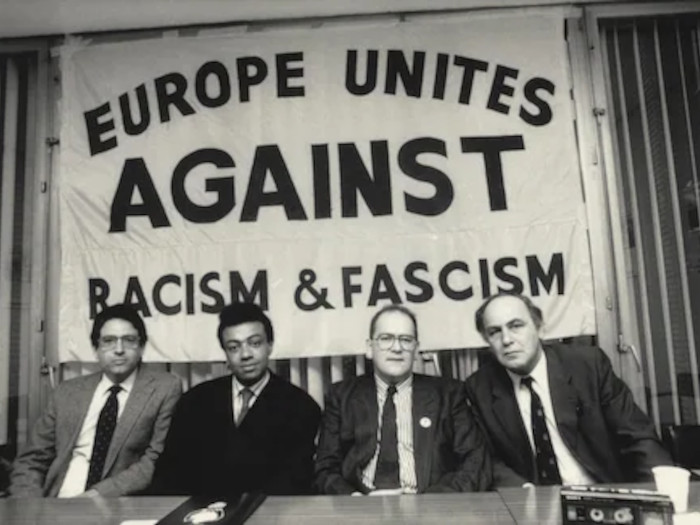
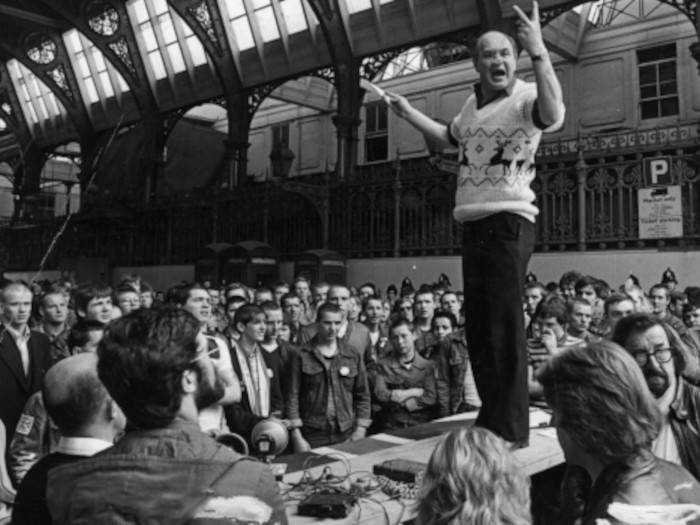
Hill became a regular columnist for Searchlight from then on, and in 1988 published a book about his experiences, The Other Face of Terror, with the journalist Andrew Bell. Called as a witness before the European Parliament's Commission on Racism and Xenophobia, Hill's evidence included the claim that within the neo-Nazi underground a system of "brown aid" existed for fugitives and those defined by the movement as political prisoners. He contended that he personally had been involved in "safehousing" several far right Italian fugitives during his political involvement. In an obituary, Searchlight Magazine described their former colleague Hill as "that giant of the anti-fascist movement".
Most of Searchlights material, however, comes from informers, who do so because of feuds with their fellow right-wingers and not from any conviction of Searchlight's cause. In 2013 it was revealed that BNP member Duncan Robertson had been a Searchlight informer, in particular of the New Right group. An Edinburgh-born Scot (albeit a Rangers supporter), Robertson was chronically unhappy but intelligent, an unfortunate combination. Accepted for a place at Cambridge University in his youth, Robertson never went, due to a severe accident. Perpetually unlucky in love, it has been rumoured that Robertson approached the Community Security Trust (intelligence arm of the Board of Deputies of British Jews and very close to the police, hereafter CST) circa 2004 and was then passed over to Searchlight, and (alleged) Special Branch. The CST has a intelligence interest in monitoring anti-semitism, holocaust denial and the far right generally. Speculation asserts that CST are (hypothetically) are doing this in such a way as to allow the police to unaccountably run proxy agents using third parties--in which category come Searchlight/Hope Not Hate, then this should be an issue of great public concern. It is understood Robertson suffered from both psychiatric problems (depression) and alcohol difficulties, hence the question: did pressure from handlers tip this unhappy man over the edge?
Searchlight was, consequently, divided into three main bodies: Searchlight magazine, the monthly anti-fascist and anti-racist magazine; Searchlight Information Services (SIS), a research and investigatory body which briefs governments, politicians, journalists, and the police; and, finally, Searchlight Educational Trust (SET), a charity devoted to challenging and defeating the extremism, racism and fascism. SIS and SET later joined the Hope not Hate campaign, and are no longer associated with Searchlight magazine. Searhlight Magazine is registered with Companies House at the same address as Hope Not Hate. Both Gery and Sonia Gable have registered their address as 49 Herent Drive, Clayhall, Ilford, Essex, IG5 0HE. Gerry Gable was appointed a director of Hope not Hate on 27th July 2011, he resigned on the 25th September 2012.
Hope not Hate (stylised as HOPE not hate) is an advocacy group based in the United Kingdom which campaigns against racism and fascism. The group was founded in 2004 by Nick Lowles, a former editor of the anti-fascist magazine Searchlight (from which it split in late 2011). It is backed by various politicians and celebrities, and it has also been backed by several trade unions. Lowles got involved with the anti-fascist movement as a student volunteer at Sheffield University. Before he became editor, he was an freelance investigative journalist, working in television, including on BBC Panorama, World in Action, Channel Four Dispatches and MacIntyre Undercover. Between 1999 and 2011 Lowles was co-editor, and then editor, of Searchlight magazine.
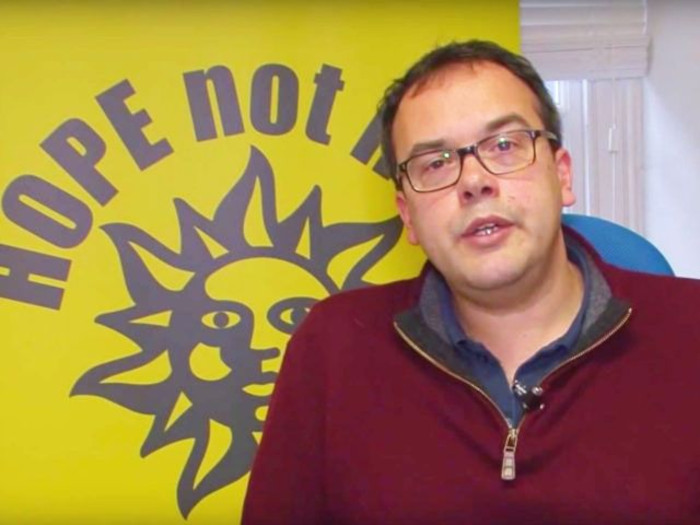
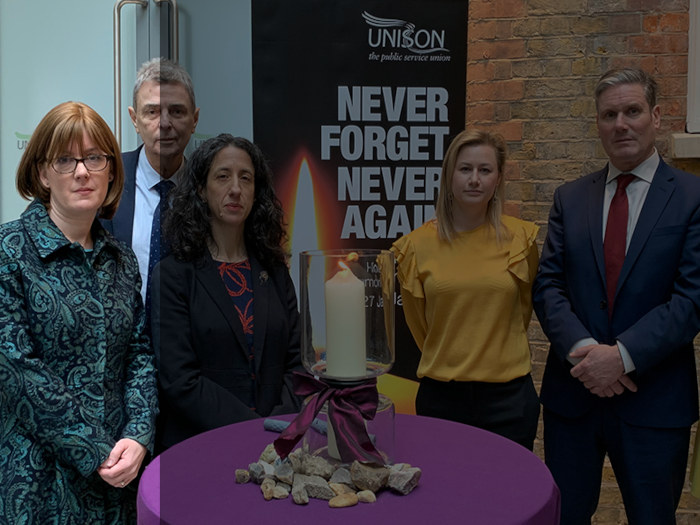
The Deputy Director is Jemma Levene, who previously worked as Head of Campaigns at Jewish cultural education (Critical Race Theory) charity SEED, and at the Orthodox Union in New York. The Political Organiser is Liron Woodcock-Velleman, Policy Officer for the Jewish Labour Movement. The organisation now consists of Hope not Hate Educational Ltd (a charitable wing) and Hope not Hate Ltd (focused on campaigning and investigative work). From 2010 to 2015, Labour MP Ruth Smeeth worked as Deputy Director; since then, she has been a director.
It was no-holds-barred, bare knuckle, PR. We used every dirty, underhand, low down, unscrupulous trick in the book. Then when the book had been used up, we tore it to shreds, set it on fire, and stuffed it down Nick Griffin’s underpants.
In 2011 Matthew Collins, a former National Front and British National Party member and part of the group's investigative team, published Hate: My Life in the British Far Right (ISBN 978-1-84954-327-9). In June 2014 Collins and Hope not Hate published original research into what they termed a far-right, Christian fundamentalist organisation, Britain First. Hope not Hate has received endorsement and national publicity from the Daily Mirror newspaper, and revolves around an annual two week bus tour in the run-up to local elections.
Hope not Hate is registered with Companies House as a private limited company situated at Suite 1, 7th Floor, 50 Broadway, London, England, SW1H 0BL (a few yards away from the Fabian Society), previous address was Suite 1, 3rd Floor, 11-12 st. James's Square London SW1Y 4LB. Persons with significant control are: Anupreet Singh Amole (Solicitor), Ruth Lauren Anderson (Campaigner), Peter Jonathan Jacobs, Gurinder Singh Josan, Anthony James Painter (Policy Director), Anna Catherine Turley and Simon Anthony Tuttle (Investment Director).
A study into the claims made by left-wing group ‘Hope Not Hate‘ has found the organisation exaggerated “hate speech” claims by over 3000 per cent following the murder of Jo Cox MP. The Economist magazine investigated the claim by the group — led by left-wing political operative Nick Lowles — that 50,000 tweets were sent “celebrating” the murder of the MP or praising her killer. The investigation concluded:
Hope Not Hate misrepresented the findings of its own report when first releasing it to the press”, adding: “The report itself gave a confusing impression of the number of tweets that celebrated Ms Cox’s murder. We estimate that, in reality, of hundreds of thousands of tweets mentioning the MP by name, the number that celebrated her death was at most 1,500, and probably much lower.
The Economist also highlighted how “Britain’s largest newspapers leapt to publish the shocking findings” of Hope Not Hate’s flawed report:
Hope Not Hate admitted that its initial press release was incorrect and said that it was later changed. The charity referred us to the study’s authors, Imran Awan of Birmingham City University and Irene Zempi of Nottingham Trent University. Mr Awan agreed that newspaper headlines had oversimplified the study’s findings. Even so both authors retweeted articles repeating the press release’s false claim.
The authors of the report also refused to share their data with the Economist for the purpose of an investigation, claiming they had encountered death threats.
So we undertook our own analysis, examining tweets from June and July that included the terms “Jo Cox” or “#JoCox”—some 341,000 unique messages. Of a random sample of 800 of these, none was celebratory, and just four seemed to be derogatory toward Ms Cox, criticising her support for Syrian refugees, for instance. From this, simple statistics suggest that the true number of tweets cheering the politician’s murder would lie between 0 and 1,500. (The Hope Not Hate report reproduces about 30.).
Hope Not Hate also “misled” the British press, public, as well as politicians by claiming a “key theme” at the time was the calling of Thomas Mair — Jo Cox’s killer — a “hero”. But the Economist found: “In fact, many tweets containing the word “hero” were referring either to Ms Cox herself or to a pensioner who was injured while intervening to save her”. The Economist then measured a random sample of Brexit-related tweets in an attempt to find widespread “xenophobia” and has since declared: “Of these, we judged less than 1% to be xenophobic or worse”.
Hope not Hate were identified in a research paper on far-left extremist violence alongside Antifa and other violent groups by the Swedish Defence Research Agency (FOI) for their “infiltration and research” of political opponents. The research paper lists the group, which has previously received funds from left-wing billionaire George Soros, as a facilitator of information for far-left extremists alongside the Swedish Expo Foundation, also funded by Soros, which objected to being included in the report. The FOI report states that the far-left scene often requests information on right-wing opponents:
that they want to hold to account in some way (for example by visiting people’s homes with threats and harassment) and sometimes they want information, names and pictures, to publicly identify those involved in nationalist movements”
The report specifically lists an operation involving former Expo writer, now Hope not Hate researcher, Patrik Hermansson, who infiltrated the alt-right and far-right circles in the UK and the U.S. in 2017. The report is not the first time Hope not Hate have been linked to radical far-left extremists as head researcher Dr. Joe Mulhall has tweeted out to Antifa accounts on a number of occasions. In one tweet he asked the account “Antifascist Network” their “thoughts” on a mini-documentary he had made for Hope not Hate in Northern Iraq in 2014.
The Antifascist Network twitter account has also tweeted out support for Antifa extremists fighting alongside Kurdish militias in Northern Syria. Antifa has long claimed their members fight with the YPG forces, though the Antifascist Network account, and other Antifa-linked accounts, have tweeted out pictures featuring symbols of the Kurdistan Workers’ Party (PKK), a proscribed terrorist group in the UK. Hope not Hate, in addition to receiving funds from George Soros’s Open Society Foundations, received funding from the UK government as well. A senior director of the group, Ms. Ruth Smeeth, is a sitting Labour MP for Stoke-On-Trent North.
Unite Against Fascism (UAF) was formed in Great Britain in late 2003 in response to electoral successes by the BNP. Its main elements were the Anti-Nazi League and the National Assembly Against Racism, with the support of the Trades Union Congress (TUC) and leading British unions such as the Transport and General Workers' Union (T&G) (now Unite) and UNISON. Among the union leaders backing UAF were Billy Hayes of the Communication Workers Union, Andy Gilchrist and Mick Shaw of the Fire Brigades Union, Mark Serwotka of the PCS public service workers' union, and Christine Blower and Kevin Courtney of the NUT. Founding signatories included David Cameron, later Prime Minister of the United Kingdom.
In 2005, the anti-fascist magazine Searchlight disaffiliated from UAF after an argument over tactics to defeat the BNP. At UAF's 2007 national conference, speakers ranged from cabinet minister Peter Hain to Edie Friedman of the Jewish Council for Racial Equality and Muhammad Abdul Bari of the Muslim Council of Britain (MCB), as well as figures from the major UK trade unions. In November 2007, UAF organised a rally of over 1,000 people when BNP leader Nick Griffin and Holocaust denier David Irving spoke at the Oxford Union. On 9 June 2009, UAF demonstrated against a BNP press conference given by Griffin and Andrew Brons outside the Palace of Westminster following their election as MEPs.
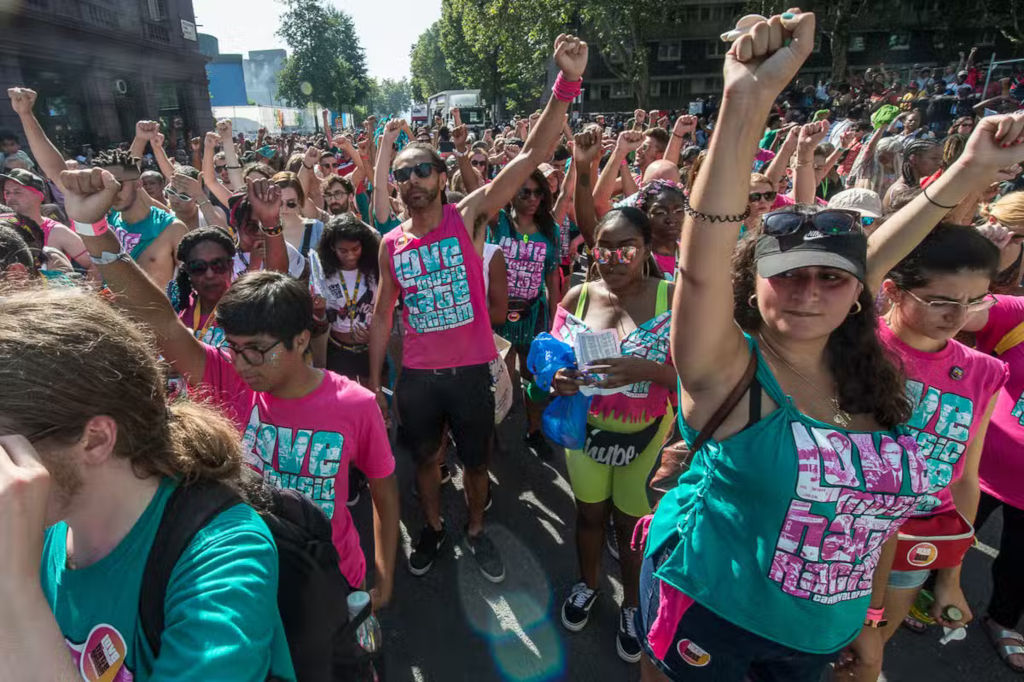
UAF has worked closely with Love Music Hate Racism (LMHR), described by UAF/SWP's Weyman Bennett as "the cultural wing of our movement". The LMHR campaign aims to bring people together and promote unity through the power of music. LMHR was born in the tradition of the Rock Against Racism (RAR) movement of the late 1970s. LMHR is a broad based campaign made up of antiracism campaigners, musicians, music industry professionals and educators. It has local groups in towns and cities around Britain. Its current spokespeople include Atlantic Records VP Paul Samuels, and in the past have included its convener and national organiser Martin Smith and Zak Cochrane.
The journalist Andrew Gilligan has claimed that the UAF's reluctance to tackle Islamism is because several of its own members are supporters of such extremism. The UAF's vice-chairman, Azad Ali, is also community affairs co-ordinator of the Islamic Forum of Europe, which Gilligan describes as "a Muslim supremacist group dedicated to changing 'the very infrastructure of society, its institutions, its culture, its political order and its creed from ignorance to Islam'". Nigel Copsey, Professor of Modern History at Teesside University, wrote that Ali's association with IFE made UAF "[run] the risk of turning a blind eye to Islamist extremism". Ali was suspended as a civil servant in the Treasury after he wrote approvingly on his blog of an Islamic militant who said that as a Muslim he is religiously obliged to kill British soldiers in Iraq, in 2009.
